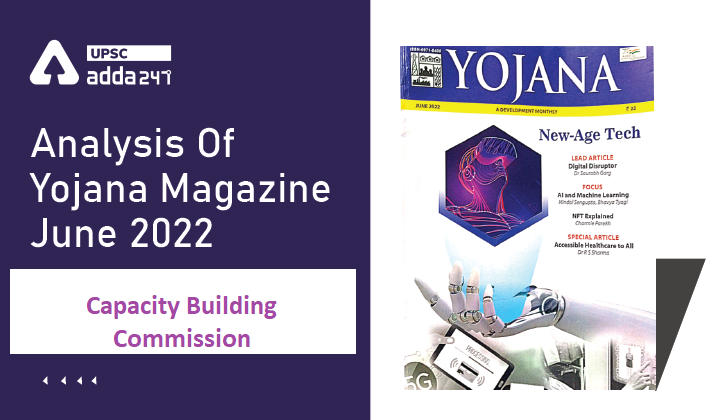Table of Contents
Yojana Magazine is a very important and indispensable source for UPSC Civil Services Exam Preparation. Here, we come with ”Analysis Of Yojana Magazine” which covers the monthly Yojana Magazine keeping in mind the demand of UPSC, particularly from the topics of important government schemes.
In ‘‘Analysis Of Yojana Magazine,” we cover each and every topic of Yojana Magazine and provide an easy-to-understand gist.
Introduction
- The capacity of civil services plays a vital role in rendering a wide variety of services, implementing welfare programmes and performing core governance functions.
- The Capacity Building Commission was constituted through the Gazette of India on 1 April 2021.
Key Functions Of CBC
As the custodian of the civil services capacity-building ecosystem, the commission is mandated to perform the following functions:
- Facilitate preparation of Annual Capacity Building Plans of departments, ministries and agencies.
- Make Policy recommendations to DoPT on personnel/ HR and Capacity Building.
- Evolve a harmonious de-siloed approach to improve civil service capacity.
- Analyze learning/ competency related data from iGOT-Karmayogi, online training platform.
- Drive standardization, harmonization and shared understanding of Capacity Building activities.
- Create shared learning resources, including internal and external faculty and resource centers.
- Exercise functional supervision over all Central Training Institutions.
- Undertake audit of Human Resources in Government and outcomes of the Capacity Building efforts.
- Approve Knowledge Partners and Content Validation mechanism for training of civil servants.
- Organize a global HR Summit to bring best practices of human resource management to the governance in India.
- Facilitate preparation of Annual Capacity Building Plans of departments, ministries and agencies.
Mission Karmyogi
- The National Programme for Civil Services Capacity Building (‘NPCSCB’) – “Mission Karmayogi” has been launched with the objective of enhancing governance through Civil Service Capacity Building.
- Aim: Mission Karmyogi aims to prepare the Indian Civil Servants for the future by making them more creative, constructive, imaginative, innovative, proactive, professional, progressive, energetic, enabling, transparent and technology-enabled.
- Mission Karmayogi will have the following six pillars:-
- (i) Policy Framework,
- (ii) Institutional Framework,
- (iii) Competency Framework,
- (iv) Digital Learning Framework (Integrated Government Online Training Karmayogi Platform (iGOT-Karmayogi),
- (v) electronic Human Resource Management System (e-HRMS), and
- (vi) Monitoring and Evaluation Framework.
Guiding Principles Of Mission Karmayogi
Mission Karmayogi is guided by 8 principles that are applied in tandem across all of the programmes covered by it
1. From Rule to Role
Empowering the Civil Service with a Shift from Rule to Role.
2. Democratising Opportunities
The democratisation of Competency Development Opportunities.
3. Continuous Guided Learning
Lifelong and Continuous Learning with Guided Learning Paths.
4. Citizen Centricity
Citizen-Centricity in Public Service Delivery with Behavioural, Functional and Domain Competencies.
5. 70-20-10 Learning Mandate
Delivering to the 70-20-10 Learning Mandate.
6. Accountability
Cultivating Accountability with Reporting, Regulation and Performance Analysis.
7. De-Siloisation
Shared Capacity Building Architecture to Reduce Silos and Promote a Shared Understanding.
8. Participative, Responsive and Intelligent Governance
Facilitating a Participative, Responsive and Intelligent Government.
Conclusion
Empowered with specific role competencies, the civil servant will be able to ensure efficient service delivery of the highest quality standards.



 TSPSC Group 1 Question Paper 2024, Downl...
TSPSC Group 1 Question Paper 2024, Downl...
 TSPSC Group 1 Answer key 2024 Out, Downl...
TSPSC Group 1 Answer key 2024 Out, Downl...
 UPSC Prelims 2024 Question Paper, Downlo...
UPSC Prelims 2024 Question Paper, Downlo...




